unit7_硕士英语综合教程_课文翻译
研究生英语课文翻译Unit 7
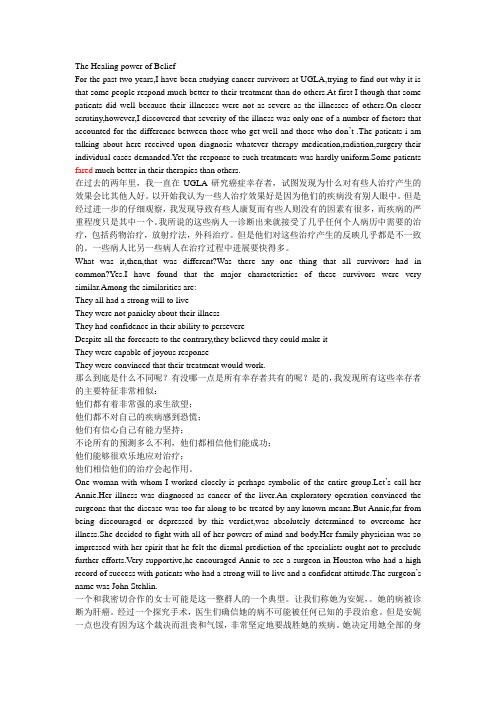
The Healing power of BeliefFor the past two years,I have been studying cancer survivors at UGLA,trying to find out why it is that some people respond much better to their treatment than do others.At first I though that some patients did well because their illnesses were not as severe as the illnesses of others.On closer scrutiny,however,I discovered that severity of the illness was only one of a number of factors that accounted for the difference between those who get well and those who don’t .The patients i am talking about here received upon diagnosis whatever therapy medication,radiation,surgery-their individual cases demanded.Yet the response to such treatments was hardly uniform.Some patients fared much better in their therapies than others.在过去的两年里,我一直在UGLA研究癌症幸存者,试图发现为什么对有些人治疗产生的效果会比其他人好。
以开始我认为一些人治疗效果好是因为他们的疾病没有别人眼中。
Unit 7 The Chaser课文翻译综合教程三
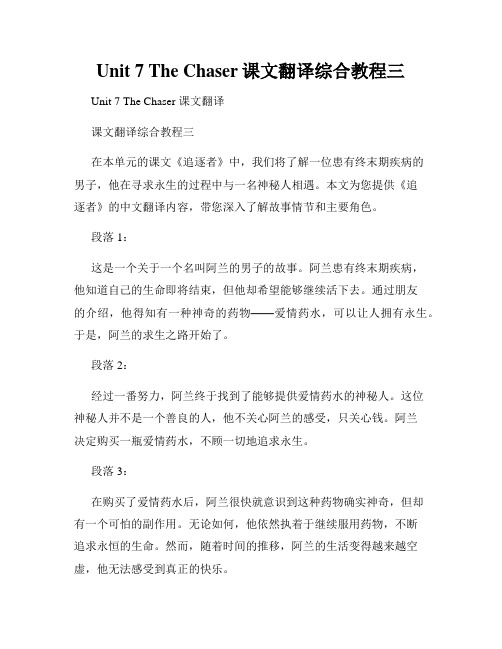
Unit 7 The Chaser课文翻译综合教程三Unit 7 The Chaser 课文翻译课文翻译综合教程三在本单元的课文《追逐者》中,我们将了解一位患有终末期疾病的男子,他在寻求永生的过程中与一名神秘人相遇。
本文为您提供《追逐者》的中文翻译内容,带您深入了解故事情节和主要角色。
段落 1:这是一个关于一个名叫阿兰的男子的故事。
阿兰患有终末期疾病,他知道自己的生命即将结束,但他却希望能够继续活下去。
通过朋友的介绍,他得知有一种神奇的药物——爱情药水,可以让人拥有永生。
于是,阿兰的求生之路开始了。
段落 2:经过一番努力,阿兰终于找到了能够提供爱情药水的神秘人。
这位神秘人并不是一个善良的人,他不关心阿兰的感受,只关心钱。
阿兰决定购买一瓶爱情药水,不顾一切地追求永生。
段落 3:在购买了爱情药水后,阿兰很快就意识到这种药物确实神奇,但却有一个可怕的副作用。
无论如何,他依然执着于继续服用药物,不断追求永恒的生命。
然而,随着时间的推移,阿兰的生活变得越来越空虚,他无法感受到真正的快乐。
段落 4:与此同时,阿兰与一个女孩相遇。
女孩对他表达了深深的爱意,但阿兰却无法回应。
因为他所追求的是永生,他已经失去了对爱情的渴望。
女孩尝试了许多方法来打动他,包括送他珍贵的礼物和展示她对他的忠诚,但都无济于事。
段落 5:最终,女孩决定采取激烈的措施。
她找到了神秘人,向他提供了足够多的金钱,以换取药物的配方。
然后,她给阿兰喝下了这种药水,希望能够一起与他度过永恒。
然而,他们的永生并不是他们所期望的那样。
段落 6:阿兰和女孩的永生迅速变得枯燥而无聊。
他们渴望真正的死亡,无法再忍受无尽的时间。
最终,他们决定向神秘人求助,希望找到一种能够使他们回归正常生活的药物,并结束他们的永生。
段落 7:然而,神秘人告诉他们,并没有真正的解药。
他们只能继续忍受永生的痛苦,除非某种偶然事件会导致他们的死亡。
他们感到绝望和无奈,只能默默等待着命运的改变。
研究生英语综合教程课文翻译+原文
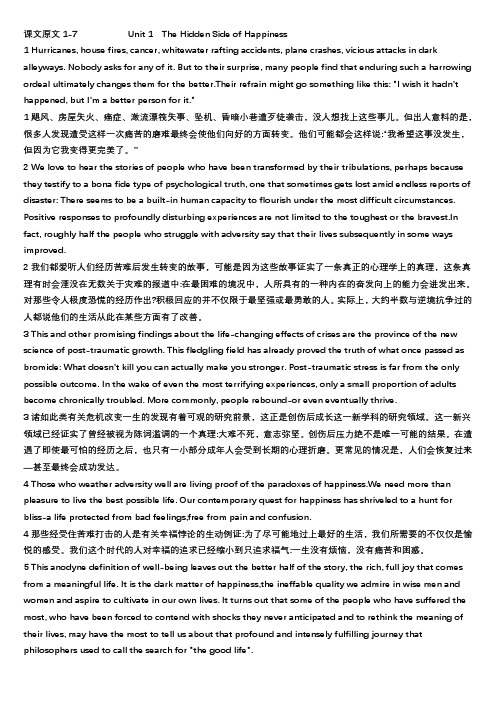
课文原文1-7 Unit 1 The Hidden Side of Happiness1 Hurricanes, house fires, cancer, whitewater rafting accidents, plane crashes, vicious attacks in dark alleyways. Nobody asks for any of it. But to their surprise, many people find that enduring such a harrowing ordeal ultimately changes them for the better.Their refrain might go something like this: "I wish it hadn't happened, but I'm a better person for it."1飓风、房屋失火、癌症、激流漂筏失事、坠机、昏暗小巷遭歹徒袭击,没人想找上这些事儿。
但出人意料的是,很多人发现遭受这样一次痛苦的磨难最终会使他们向好的方面转变。
他们可能都会这样说:“我希望这事没发生,但因为它我变得更完美了。
”2 We love to hear the stories of people who have been transformed by their tribulations, perhaps because they testify to a bona fide type of psychological truth, one that sometimes gets lost amid endless reports of disaster: There seems to be a built-in human capacity to flourish under the most difficult circumstances. Positive responses to profoundly disturbing experiences are not limited to the toughest or the bravest.In fact, roughly half the people who struggle with adversity say that their lives subsequently in some ways improved.2我们都爱听人们经历苦难后发生转变的故事,可能是因为这些故事证实了一条真正的心理学上的真理,这条真理有时会湮没在无数关于灾难的报道中:在最困难的境况中,人所具有的一种内在的奋发向上的能力会进发出来。
熊海虹主编《高等学校研究生英语综合教程-上》Unit7-Unit10课文翻译及课后练习答案
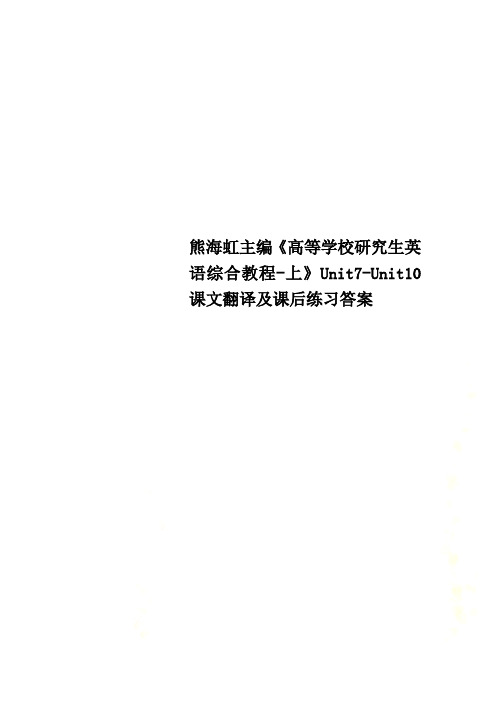
熊海虹主编《高等学校研究生英语综合教程-上》Unit7-Unit10课文翻译及课后练习答案Unit SevenON HUMAN NATURE Frank and Lydia Hammer 我对人类的了解越多,对他们的期望就越低。
和以前相比,我现在常常以较宽松的标准把一个人叫做好人。
——塞缪尔·约翰逊博士论人性弗兰克,莉迪亚·汉默尔1 Human nature is the basis of character, the temperament and disposition; it is that indestructible matrix upon which the character is built, and whose shape it must take and keep throughout life. This we call a person's nature.1人性是性格、气质和性情的基础,性格正是基于这种牢不可破的基质之上的,它必须以这种基质的形式存在,并将它保留终生,这种基质,我们称之为一个人的本性。
2 The basic nature of human beings does not and cannot change. It is only the surfacethat is capable of alteration, improvement and refinement; we can alter only people's customs, manners, dress and habits. A study of history reveals that the people who walked thisearth in antiquity were moved by the same fundamental forces, were swayed by the same passions, and had the same aspirations as the men and women of today. The pursuit of happiness still engrosses mankind the world over.2人类的本性不会也不能改变,只有一些表面特征才会变化、改善和进一步提升;我们可以改变人们的风格、举止、衣着和习惯。
研究生英语综合教程UNIT7课文及翻译(含汉译英英译汉)
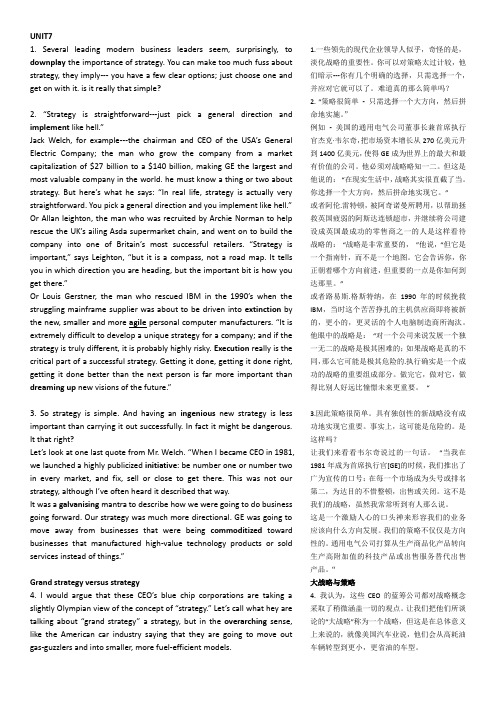
UNIT71. Several leading modern business leaders seem, surprisingly, to downplay the importance of strategy. You can make too much fuss about strategy, they imply--- you have a few clear options; just choose one and get on with it. is it really that simple?2. “Strategy is straightforward---just pick a general direction and implement like hell.”Jack Welch, for example---the chairman and CEO of the USA’s General Electric Company; the man who grow the company from a market capitalization of $27 billion to a $140 billion, making GE the largest and most valuable company in the world. he must know a thing or two about strategy. But here’s what he says: “In real life, strategy is actually very straightforward. You pick a general direction and you implement like hell.”Or Allan leighton, the man who was recruited by Archie Norman to help res cue the UK’s ailing Asda supermarket chain, and went on to build the company into one of Britain’s most successful retailers. “Strategy is important,” says Leighton, “but it is a compass, not a road map. It tells you in which direction you are heading, but the important bit is how you get there.”Or Louis Gerstner, the man who rescued IBM in the 1990’s when the struggling mainframe supplier was about to be driven into extinction by the new, smaller and more agile personal computer manufacturers. “It is extremely difficult to develop a unique strategy for a company; and if the strategy is truly different, it is probably highly risky. Execution really is the critical part of a successful strategy. Getting it done, getting it done right, getting it done better than the next person is far more important than dreaming up new visions of the future.”3. So strategy is simple. And having an ingenious new strategy is less important than carrying it out successfully. In fact it might be dangerous. It that right?Let’s look at one last quote from Mr. Welch. “When I became CEO in 1981, we launched a highly publicized initiative: be number one or number two in every market, and fix, sell or close to get there. This was not our strategy, although I’ve often heard it descri bed that way.It was a galvanising mantra to describe how we were going to do business going forward. Our strategy was much more directional. GE was going to move away from businesses that were being commoditized toward businesses that manufactured high-value technology products or sold services instead of things.”Grand strategy versus strategy4. I would argue that these CEO’s blue chip corporations are taking a slightly Olympian view of the concept of “strategy.” Let’s call what hey are talking about “grand strategy” a strategy, but in the overarching sense, like the American car industry saying that they are going to move out gas-guzzlers and into smaller, more fuel-efficient models. 1.一些领先的现代企业领导人似乎,奇怪的是,淡化战略的重要性。
熊海虹主编《高等学校研究生英语综合教程-上》Unit7-Unit10课文翻译及课后练习答案
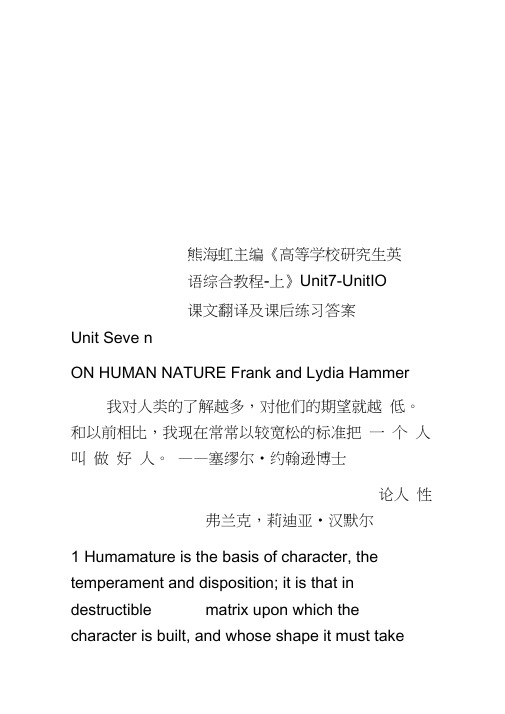
熊海虹主编《高等学校研究生英语综合教程-上》Unit7-UnitIO课文翻译及课后练习答案Unit Seve nON HUMAN NATURE Frank and Lydia Hammer 我对人类的了解越多,对他们的期望就越低。
和以前相比,我现在常常以较宽松的标准把一个人叫做好人。
——塞缪尔•约翰逊博士论人性弗兰克,莉迪亚•汉默尔1 Humamature is the basis of character, the temperament and disposition; it is that in destructible matrix upon which the character is built, and whose shape it must takeand keep throughout life. This we call a pers on's n ature.1人性是性格、气质和性情的基础,性格正是基于这种牢不可破的基质之上的,它必须以这种基质的形式存在,并将它保留终生,这种基质,我们称之为一个人的本性。
2 The basic n ature of huma n beings does not and cannot cha nge. It is only the surface that is capable of alterati on, improveme nt and refi neme nt; we can alter only people's customs, manners, dress and habits. A study of history reveals that the people who walked thisearth in an tiquity were moved by the same fun dame ntal forces, were swayed by the same passi ons, and had the same aspirati ons as the men and wome n of today. The pursuit of happ in ess still en grosses mankind the world over.2人类的本性不会也不能改变,只有一些表面特征才会变化、改善和进一步提升;我们可以改变人们的风格、举止、衣着和习惯。
Unit 7 The Monster课文翻译综合教程四
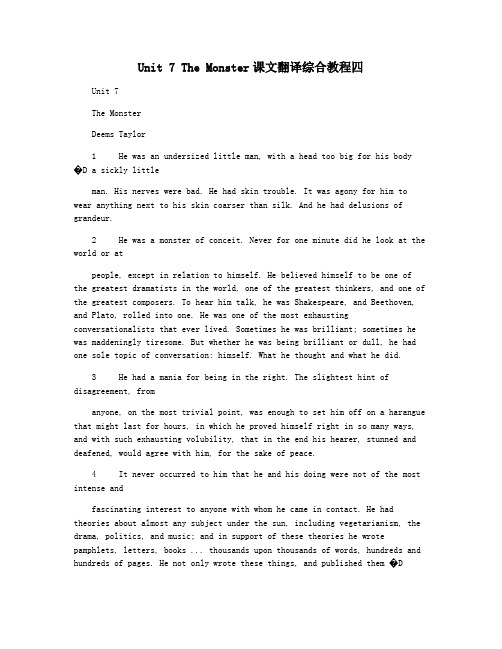
Unit 7 The Monster课文翻译综合教程四Unit 7The MonsterDeems Taylor1 He was an undersized little man, with a head too big for his body�D a sickly littleman. His nerves were bad. He had skin trouble. It was agony for him to wear anything next to his skin coarser than silk. And he had delusions of grandeur.2 He was a monster of conceit. Never for one minute did he look at the world or atpeople, except in relation to himself. He believed himself to be one of the greatest dramatists in the world, one of the greatest thinkers, and one of the greatest composers. To hear him talk, he was Shakespeare, and Beethoven, and Plato, rolled into one. He was one of the most exhausting conversationalists that ever lived. Sometimes he was brilliant; sometimes he was maddeningly tiresome. But whether he was being brilliant or dull, he had one sole topic of conversation: himself. What he thought and what he did.3 He had a mania for being in the right. The slightest hint of disagreement, fromanyone, on the most trivial point, was enough to set him off on a harangue that might last for hours, in which he proved himself right in so many ways, and with such exhausting volubility, that in the end his hearer, stunned and deafened, would agree with him, for the sake of peace.4 It never occurred to him that he and his doing were not of the most intense andfascinating interest to anyone with whom he came in contact. He had theories about almost any subject under the sun, including vegetarianism, the drama, politics, and music; and in support of these theories he wrote pamphlets, letters, books ... thousands upon thousands of words, hundreds and hundreds of pages. He not only wrote these things, and published them �Dusually at somebody else’s expense �D but he would sit and read them aloud, for hours, to his friends, and his family.5 He had the emotional stability of a six-year-old child. When he felt out of sorts,he would rave and stamp, or sink into suicidal gloom and talk darkly of going to the East to end his days as a Buddhist monk. Ten minutes later, when something pleased him he would rush out of doors and run around the garden, or jump up and down off the sofa, or stand on his head. He could be grief-stricken over the death of a pet dog, and could be callous and heartless to a degree that would have made a Roman emperor shudder.6 He was almost innocent of any sense of responsibility. He was convinced that感谢您的阅读,祝您生活愉快。
研究生英语综合教程英语原文 Unit7

Unit Seven ON HUMAN NATURE Frank and Lydia Hammer1 Human nature is the basis of character, the temperament and disposition; it is that indestructible matrix upon which the character is built, and whose shape it must take and keep throughout life. This we call a person's nature.2 The basic nature of human beings does not and cannot change. It is only the surface that is capable of alteration, improvement and refinement; we can alter only people's customs, manners, dress and habits. A study of history reveals that the people who walked this earth in antiquity were moved by the same fundamental forces, were swayed by the same passions, and had the same aspirations as the men and women of today. The pursuit of happiness still engrosses mankind the world over.3 Moreover no one wishes his nature to change. One may covet the position of President or King, but would not change places with them unless, it meant the continuance of his own identify. Each man sees himself as unique, and so far as he is concerned the hub of the universe, different from any other individual. Apologies are in order when Mr. Smith is mistaken for Mr. Jones.4 Every man unfolds a distinct character over which circumstances and education have only the most limited control. No two people will ever draw the same conclusions from the same experiences, but each must interpret events and fit them into the mosaic of his own life's pattern. Human nature is ever true itself, not to systems of faith or education. Each holds to the structure of the mold into which the soul was cast at the time of its individualization. The qualities born in one remain as potentials whether they have a chance to develop or not. Under pressure, or change of interest, they can partially or wholly disappear from view, tor considerable periods of time; but nothing can permanently modify them, nothing can obliterate them.5 The constancy of human nature is proverbial, as no one believes that a man can fundamentally change his nature. This is why it is so difficult for one who has acquired an unsavory reputation to re-establish himself in public confidence. People know from experience that an individual who in one year displays knavish characteristics- seldom in the next becomes any different. Nor does a thief become a trustworthy employee, or a miser a philanthropist. Nor does a man change and become a liar, coward or traitor at fifty or sixty; if he is one then, he has been one ever since his character was formed. Big criminals are first little criminals, just as giant oaks are first little acorns.6 Although man is potentially perfect he is far from being actually so. If he were actually perfect there would be nothing for preachers and humanitarians to do; no use for churches, schools, courts and prisons. Therefore while it is impossible to change human nature, it can be studied, controlled and directed, and this should be the supreme function of our religious, educational and social institutions.7 Man is perfect as a seed is perfect, germinally. The spirit is perfect, but when it inhabits human structures, it participates in the imperfections of the later; and during its association with matter takes on the mortal weakness, desires and limitations. But the spirit, the inner man, remains untouched and undefiled by evil. Only the outer man- the personality and the physical body- becomes imperfect, due to ignorance, wrong thinking and violation of the law of being. The outerman, too, was originally perfect, but man has so desecrated and abused it that today it is a far cry from the original model.8 Man's majesty and nobility are taken for granted, although his faults and weaknesses are constantly paraded before our eyes. Only when behavior deviates from the normal does it attract attention. The good neighbor, the conscientious citizen, the kind father and faithful husband pass unnoticed. But the murderer, robber or wife beater is singled out for ublicity, because such conduct is unusual.9 Man's inherent goodness, moreover, is revealed by his countless acts of heroism, unselfishness and sacrifice. Daily one reads of men saving others at the peril of their own lives. One plunges into the surf and rescues a swimmer from drowning; another dashes into a burning house and carries a stranger to safety; others snatch a child from the wheels of death; many give their blood so that others may live. Countless unnamed and unrecorded men have given their lives for their fellowmen, not only on the battlefront but on the home- front as well.10Human nature does not and cannot change but unfolds its inherent pattern. Man has a nature and its laws can be known. We can only endeavor to understand man as he is.。
- 1、下载文档前请自行甄别文档内容的完整性,平台不提供额外的编辑、内容补充、找答案等附加服务。
- 2、"仅部分预览"的文档,不可在线预览部分如存在完整性等问题,可反馈申请退款(可完整预览的文档不适用该条件!)。
- 3、如文档侵犯您的权益,请联系客服反馈,我们会尽快为您处理(人工客服工作时间:9:00-18:30)。
Unit 7Exploration is an important survival strategy in evolution.探索是进化过程中一个重要的生存策略。
The migration of expansive species depends on exploring their immediate or distant surroundings for new food sources or safe habitats; it can also come as a result of population pressures or environmental changes.数量不断扩张的物种的迁移有赖于对临近或遥远的新的食物来源或安全的栖息地进行探索,这是人口压力或是环境变化的结果。
The human species has added another reason for exploration, namely curiosity. This intellectual urge to explore the unknown led the great European explorers to the Americas, Australia and Antarctica between the fifteenth and seventeenth centuries.而人类还增加了另外一个探索的原因,即好奇心。
这种对未知事物进行探索的思想冲动引领着伟大的欧洲探险家们在15世纪到17世纪之间来到了美洲,澳大利亚和南极洲。
Inquisitiveness about nature is also the driving force behind humans exploring the polar caps, climbing mountain peaks and diving into the abysses of the oceans.对大自然的好奇心同样也是人类探索极地冰冠,攀登山峰和潜入海底背后的驱动力。
Now, the ultimate frontier to explore in the twenty-first century is space. Astronomical observations and satellites have already yielded immense knowledge about our solar system and the universe beyond.现在二十一世纪探索的最终前沿便是太空。
天文观测和人造卫星已经为我们提供了关于太阳系内外的宇宙的丰富知识。
But these technologies can provide only a limited picture of what is out there; eventually humans themselves will have to travel to other planets to investigate them in more intimate detail.但是这些技术只能提供一些有限的概况,让我们知道那里都有些什么。
最终人类还是要亲自前往其他星球以进行更详细的研究。
Tremendous advances in rocket and spaceship technologies during the past 50 years, driven mainly by national security considerations, the need for better communication or a desire to observe environmental changes and human activity on the ground, have made it possible to send humans into near-Earth orbit and to the Moon.过去五十年间国家安全方面的考虑促使火箭和飞船技术取得了巨大进步。
现在,人类已经能够进入近地轨道和月球以便能够更好地实现通讯效果或是观察环境变化以及地面人类活动。
Conceivably, these advances will eventually make it possible to transport astronauts to other planets, and Mars in particular.可以想象,这些进展将最终能将宇航员送至其他星球,尤其是火星。
But there are significant differences between exploring Earth and exploring space. First and foremost, space is an unforgiving environment that does not tolerate human errors or technical failure. For humans leaving Earth’s orbit for extended periods, there are even more dangers. One is the near absence of gravity in space; the presence of high-energy, ionizing cosmic ray (HZE) nuclei is another.但是探索地球和探索太空有着巨大的差异。
首先,太空是一个不容许任何人为错误或技术故障的无情的环境。
对于长时间离开地球轨道的人而言风险会更多。
一个是太空中几近全无的重力,而另外一个则是高能量电离宇宙射线(HZE)核子的存在。
Because both zero gravity and cosmic rays would have severe health implications for astronauts on a Mars-bound spaceship, we first need to investigate their effects on cells, tissues and our hormonal and immune systems.由于零重力和宇宙射线会对前往火星的飞船上的宇航员有着严重的健康影响,我们首先要研究它们对细胞,组织和人类荷尔蒙与免疫系统的影响。
However, although we are able to produce HZE nuclei on Earth and study their effects on biological material, we cannot simulate extended periods of low gravity and their additive effects on cells and tissues.然而,尽管我们能够在地面制造HZE核子并研究其对生物材料的影响,但是我们无法长久的模拟低重力时段以及它们二者对细胞和组织的累加效应。
Thus, the International Space Station (ISS) will have an enormously important role in assessing the health dangers for humans in space and in the development of potential countermeasures.因此,国际空间站(ISS)将会为人类在太空进行健康风险评估以及制定应对措施方面扮演重要的角色。
here is much information on the adaptation of astronauts to zero gravity (0g) in space and on their return to 1g on Earth. 关于宇航员是如何适应从太空中的零重力(0g)到地球的1g的信息已经有了很多,Nevertheless, our understanding of these effects is not complete; nor have countermeasures to mitigate them been identified. 但是我们对这些影响的了解还是不够全面,也不明了有那些对策能够减轻这些影响。
Observations of astronauts travelling on the Space Shuttle and Russian cosmonauts’ long-term visits to the Mir space station indicate that time spent in 0g has serious effects on bone and muscle physiology and the cardiovascular system. For instance, the return from 0g to 1g leads to an inability to maintain an appropriate blood pressure when in an upright position — orthostatic intolerance—and insufficient blood flow to the brain.通过对在航天飞船上和长期驻扎在俄罗斯和平号空间站上宇航员的观察发现零重力对骨骼和肌肉生理以及心血管系统都有着严重的影响。
例如,由0g返回至1g会导致人无法在直立的体位维持正常的血压,即直立耐受不良,还会导致脑部供血不足。
Astronauts returning from orbit therefore have to rest for several minutes, and the time needed to normalize their blood pressure increases with the time spent in 0g. 因此,宇航员从轨道返回后需要休息几分钟。
恢复正常血压所需的时间和他们在零重力环境中所处的时间成正比。
This could mean that astronauts travelling to Mars—which would take at least one year in 0g—would need considerable time to readapt to gravity after landing there or after their return to Earth, unless we find a technological solution to the creation of artificial gravity on a spaceship.这就意味着前往火星的宇航员无论是在登陆后还是在返回地球后都将需要相当长的时间来重新适应重力,因为他们至少将有一年的时间处于零重力状态,除非我们可以找到一个技术解决方案能在宇宙飞船上人工建立重力。
